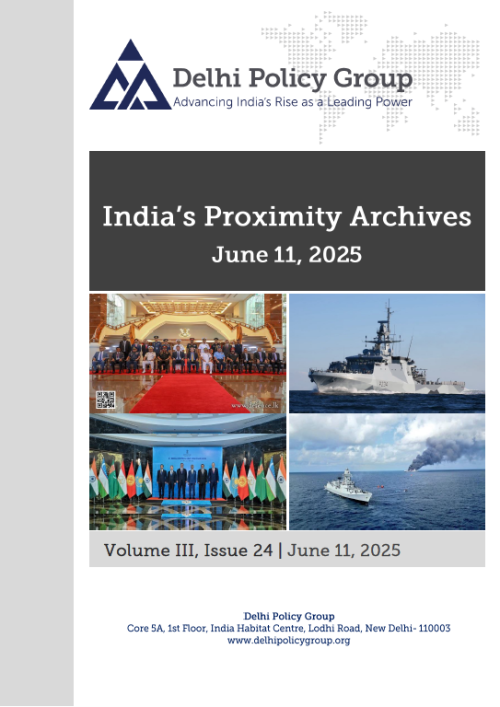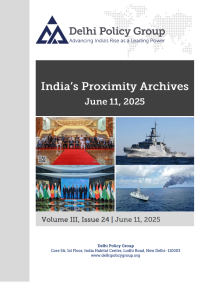India’s Proximity Archives
Date: June 11, 2025
South Asia
On June 10, Pakistan’s Finance Minister, Muhammad Aurangzeb, presented the 2025-2026 federal budget, adhering to Int¬ernational Monetary Fund (IMF) guidelines. A budget of USD 9.18 billion was allocated to the armed forces, representing the most substantial annual increase in defence expenditure in over a decade. The revised allocation reflects a 20.2% increase from the preceding fiscal year’s budget, resulting in defence expenditures approximating 1.97% of the GDP, an increase from 1.7% in the previous year. This increase is in contrast to the decline in national health and education spending as a percentage of GDP; figures for the first nine months of the current fiscal year fell significantly below 1 per cent. Expenditures allocated to tangible assets, encompassing arms and equipment acquisition, are projected to increase by 20.9 per cent. Significant military procurements and funding for nuclear and missile programs are purportedly channelled through undisclosed budgetary allocations.
On June 10, Pakistan’s Finance Minister, Muhammad Aurangzeb, presented the 2025-2026 federal budget, adhering to Int¬ernational Monetary Fund (IMF) guidelines. A budget of USD 9.18 billion was allocated to the armed forces, representing the most substantial annual increase in defence expenditure in over a decade. The revised allocation reflects a 20.2% increase from the preceding fiscal year’s budget, resulting in defence expenditures approximating 1.97% of the GDP, an increase from 1.7% in the previous year. This increase is in contrast to the decline in national health and education spending as a percentage of GDP; figures for the first nine months of the current fiscal year fell significantly below 1 per cent. Expenditures allocated to tangible assets, encompassing arms and equipment acquisition, are projected to increase by 20.9 per cent. Significant military procurements and funding for nuclear and missile programs are purportedly channelled through undisclosed budgetary allocations.
Southeast Asia
On June 6, Thailand’s military said it was ready to launch a “high-level operation” to counter any violation of its sovereignty, regarding the border dispute with Cambodia that re-erupted with a deadly clash on May 28. The army said in a statement that its intelligence gathering indicated Cambodia had increased military readiness at the border while diplomatic efforts were ongoing, describing that as “worrisome”. Thai Prime Minister Paetongtarn Shinawatra held a meeting of the National Security Council on the same day and said that while the military was ready to defend Thai sovereignty, it would still pursue dialogue through peaceful means. Cambodia and Thailand had for days exchanged carefully worded statements committing to dialogue after the brief skirmish in an un-demarcated border area, however, ahead of Friday’s meeting, the Thai army affirmed that it was “now ready for a high-level military operation in case it is necessary to retaliate”.
On June 6, Thailand’s military said it was ready to launch a “high-level operation” to counter any violation of its sovereignty, regarding the border dispute with Cambodia that re-erupted with a deadly clash on May 28. The army said in a statement that its intelligence gathering indicated Cambodia had increased military readiness at the border while diplomatic efforts were ongoing, describing that as “worrisome”. Thai Prime Minister Paetongtarn Shinawatra held a meeting of the National Security Council on the same day and said that while the military was ready to defend Thai sovereignty, it would still pursue dialogue through peaceful means. Cambodia and Thailand had for days exchanged carefully worded statements committing to dialogue after the brief skirmish in an un-demarcated border area, however, ahead of Friday’s meeting, the Thai army affirmed that it was “now ready for a high-level military operation in case it is necessary to retaliate”.
East Asia
On June 10, South Korean President Lee Jae-myung and Chinese President Xi Jinping held their first official conversation on a phone call. President Lee invited Xi to the APEC summit in Korea this October, potentially marking Xi's first visit to South Korea in 11 years. Both leaders emphasising mutual respect and reciprocity, affirmed their commitment to deepen Seoul-Beijing strategic ties by expanding cooperation in economy, security, and culture. They also pledged coordination for the APEC events, with China hosting in 2026. Lee urged China to support peace and denuclearisation on the Korean Peninsula, to which Xi responded affirmatively. Xi also emphasised strengthening strategic trust, promoting multilateralism, and ensuring stable supply chains. The call comes amid Seoul's balancing act between U.S. security alliances and vital economic ties with China. The relationship has faced recent strains, particularly over the THAAD missile defence system.
On June 10, South Korean President Lee Jae-myung and Chinese President Xi Jinping held their first official conversation on a phone call. President Lee invited Xi to the APEC summit in Korea this October, potentially marking Xi's first visit to South Korea in 11 years. Both leaders emphasising mutual respect and reciprocity, affirmed their commitment to deepen Seoul-Beijing strategic ties by expanding cooperation in economy, security, and culture. They also pledged coordination for the APEC events, with China hosting in 2026. Lee urged China to support peace and denuclearisation on the Korean Peninsula, to which Xi responded affirmatively. Xi also emphasised strengthening strategic trust, promoting multilateralism, and ensuring stable supply chains. The call comes amid Seoul's balancing act between U.S. security alliances and vital economic ties with China. The relationship has faced recent strains, particularly over the THAAD missile defence system.
West Asia
The US Ambassador to Israel, Mike Huckabee, informed on June 10, in advance of the upcoming UN conference on the Israel-Palestine conflict, that the US will not support the establishment of an independent Palestinian state. Amb. Huckabee suggested that should a Palestinian state be formed, it might be located elsewhere in the Middle East instead of the West Bank. Analysts noted that Israeli settlements in the West Bank have already undermined the Palestinian Authority (PA) and made the creation of a Palestinian state nearly impossible. Meanwhile, Palestinian President Mahmoud Abbas condemned Hamas' October 7, 2023, terror attack on Israel, in a letter to French President Emmanuel Macron and Saudi Arabia’s Crown Prince and Prime Minister Mohammed bin Salman, who are co-chairing the UN conference on the Israel-Palestine conflict.
The US Ambassador to Israel, Mike Huckabee, informed on June 10, in advance of the upcoming UN conference on the Israel-Palestine conflict, that the US will not support the establishment of an independent Palestinian state. Amb. Huckabee suggested that should a Palestinian state be formed, it might be located elsewhere in the Middle East instead of the West Bank. Analysts noted that Israeli settlements in the West Bank have already undermined the Palestinian Authority (PA) and made the creation of a Palestinian state nearly impossible. Meanwhile, Palestinian President Mahmoud Abbas condemned Hamas' October 7, 2023, terror attack on Israel, in a letter to French President Emmanuel Macron and Saudi Arabia’s Crown Prince and Prime Minister Mohammed bin Salman, who are co-chairing the UN conference on the Israel-Palestine conflict.
Central Asia
On June 6, the 4th meeting of the India-Central Asia Dialogue was held in New Delhi under the chairmanship of the External Affairs Minister of India. Ministers of Foreign Affairs of the Republic of Kazakhstan, the Kyrgyz Republic, the Republic of Tajikistan, Turkmenistan and the Republic of Uzbekistan took part in the meeting. During the meeting, Kazakhstan’s Deputy Prime Minister and Foreign Minister Murat Nurtleu highlighted India’s role as a key strategic partner and outlined a vision to triple bilateral trade, expand energy and digital cooperation, and invite Indian investment in infrastructure and innovation.
On June 6, the 4th meeting of the India-Central Asia Dialogue was held in New Delhi under the chairmanship of the External Affairs Minister of India. Ministers of Foreign Affairs of the Republic of Kazakhstan, the Kyrgyz Republic, the Republic of Tajikistan, Turkmenistan and the Republic of Uzbekistan took part in the meeting. During the meeting, Kazakhstan’s Deputy Prime Minister and Foreign Minister Murat Nurtleu highlighted India’s role as a key strategic partner and outlined a vision to triple bilateral trade, expand energy and digital cooperation, and invite Indian investment in infrastructure and innovation.
Indian Ocean Region
On June 9, a major maritime emergency unfolded when the Singapore-flagged container ship MV Wan Hai 503 experienced an internal container explosion, leading to a major fire while sailing off the Kerala coast in India. The vessel was en route from Colombo to Nhava Sheva Port in Mumbai with 22 crew members onboard. The distress call was received by Indian authorities, prompting an immediate and closely coordinated search and rescue operation involving the Indian Navy, Indian Coast Guard, Directorate General of Shipping, and other stakeholders. After receiving inputs of the incident from IF-IOR, the Indian Navy swiftly deployed INS Surat and a Dornier aircraft. Of the rescued crew, several were injured—two critically—but all received prompt medical care upon arrival. Meanwhile, the vessel continued to burn, with persistent explosions and a dangerous list, prompting ongoing firefighting and environmental protection efforts by the Coast Guard and other agencies.
On June 9, a major maritime emergency unfolded when the Singapore-flagged container ship MV Wan Hai 503 experienced an internal container explosion, leading to a major fire while sailing off the Kerala coast in India. The vessel was en route from Colombo to Nhava Sheva Port in Mumbai with 22 crew members onboard. The distress call was received by Indian authorities, prompting an immediate and closely coordinated search and rescue operation involving the Indian Navy, Indian Coast Guard, Directorate General of Shipping, and other stakeholders. After receiving inputs of the incident from IF-IOR, the Indian Navy swiftly deployed INS Surat and a Dornier aircraft. Of the rescued crew, several were injured—two critically—but all received prompt medical care upon arrival. Meanwhile, the vessel continued to burn, with persistent explosions and a dangerous list, prompting ongoing firefighting and environmental protection efforts by the Coast Guard and other agencies.



